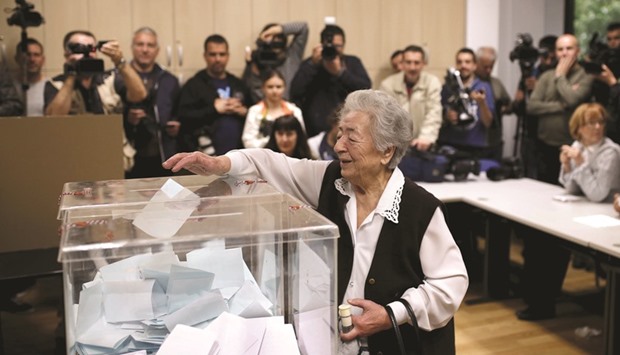Serbians voted yesterday in a general election that is likely to return pro-European Prime Minister Aleksandar Vucic to power, but also give a voice in parliament to the pro-Russian far right.
While Vucic’s nominally conservative Serbian Progressive Party is projected to win about half of the votes, resurgent ultra-nationalists who want the Balkan country to deepen its alliance with Russia, instead of Europe, are also expected to win seats.
Casting his vote in a Belgrade suburb, Vucic said he was “not going to make any compromise” with right-wing parties and expressed hope that voters would choose a “European path”.
“I’m almost certain that we’ll carry on our EU integration process,” he said.
Vucic called the early election saying he needed a clear mandate to press ahead with the reforms required to join the European Union.
Serbia, home to 7mn people, opened the first formal stages in EU accession negotiations in December, although Brussels has said there will be no further enlargement of the bloc until 2020.
But critics see the vote as an attempt by Vucic to consolidate power, expressing concerns about his authoritarian tendencies including curbs on media freedom.
The 46-year-old premier was once a staunch ultra-nationalist, but has remodelled himself as a pro-European reformist.
The election is Serbia’s third in four years and enthusiasm appeared in short supply as voters queued at polling stations, which are due to close at 8pm (1800 GMT).
“We have elections too often,” said retired Jelica Nikolic, 68, in Belgrade, who said she and her husband Radomir were voting more out of duty than conviction.
In the southwestern city of Novi Pazar, 40-year-old Edib Mahmutovic said “life is hard” and hoped the election winners would “create new jobs that enable us to stay here and not have to look for a better life elsewhere in Europe”.
Vucic’s current Socialist coalition partners are trailing him in second place in opinion polls, while fragmented centrist and liberal opposition groups are expected to just make the threshold for entering the 250-seat parliament.
Pro-Russian far-right groups are expected between them to take 10% to 15% of the vote after several years without seats in parliament.
All eyes are on ultra-nationalist Vojislav Seselj, leader of the Serbian Radical Party, who was recently acquitted by UN judges of war crimes charges arising from the 1990s Balkan conflicts.
As he voted in the capital, the 61-year-old said the Radicals “could form a coalition with parties that renounce the European Union and favour integration with Russia”.
Although a victory is out of reach for his party, Serbia’s low living standards and high unemployment, plus Western demands to streamline the inefficient state sector, may endear nationalists to some discontented voters.
“Serbia will be safe only if it aligns with Moscow, which has always helped us and never bombed us,” Seselj said at his final rally in the northern city of Novi Sad, referring to the 1999 Nato bombing of Serbia during the Kosovo war.
As a fellow Slavic and largely Orthodox Christian country, Russia is seen as a supportive big brother figure by many in Serbia, and Vucic treads a fine line in his foreign friendships.
“Of course we’re preserving our traditional ties with all our friends in the East,” he said as he voted.
Russia’s positive image stems partly from its support on controversial issues such as Kosovo’s independence from Serbia, declared in 2008, which has been recognised by more than 100 countries but is denied by Moscow and Belgrade.

An elderly woman casts her vote under the media glare at a polling station in Belgrade.
